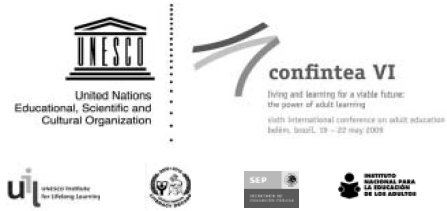CONFINTEA VI
Preparatory Conference in Latin America and the Caribbean
in Mexiko City
From Literacy to Lifelong Learning: Towards the Challenges of the 21st Century
Statement
…
Strategies and Recommendations
Recognizing that the fulfillment of the human right to adult and youth education is conditioned by the implementation of policies which seek to overcome the profound economic and social inequities of the countries in the region, it is imperative:
Policies
1. To recognize Adult and Youth Education (AYE) as a human and citizen right, which implies more commitment and political will from national and local governments for the creation and reinforcement of quality learning provision throughout life, guaranteeing that AYE policies take account of cultural, lin guistic, racial, ethnic and gender diversities and include programmes which are linked to training for decent work, active citizenship and peace, in order to strengthen and promote community empowerment.
2. To promote policies and legislation which integrate AYE into public education systems and guarantee its application while encouraging changes to make the systems more flexible and to adjust standards to goals and challenges. This should be supported by the creation of public watchdogs to monitor policies and the use of resources.
3. To construct coordination mechanisms at national level which help to establish an integrated policy to promote inter-sectoral and inter-institutional efforts which articulate the actions of the state with those of civil society (organized social movements, churches, trade unions, employers amongst others) and make possible a holistic approach in addition to follow-up and social control.
4. To continue seeking approaches which strengthen and guarantee lifelong learning which include literacy and basic education; the promotion of read ing and a written culture as the basis for the creation of literate environments, with different tools for overcoming inequality and poverty in the region and for constructing alternative forms of development. In this sense, the valuing of popular and non-formal education is fundamental.
5. To elaborate policies for the initial and continuing training of teachers of young people and adults with the participation of universities, systems of education and social movements, in order to raise the quality of educational processes and to guarantee an improvement in the working and professional conditions of educators and school staff.
Funding
6. To recommend more significant proportions of the national budget for educa tion – at least 6 % of the GNP – and guarantee within this budget specific resources for AYE – at least 3 % of the educational budget – which allows them to be executed with transparency, efficacy and efficiency.
7. To guarantee inter-sectoral resources – national and international, from public and private funds – for plans, programmes and projects of AYE which include a gender perspective and recognition of diversity, which make possible the development of affirmative action policies and the funding of studies which demonstrate the social and economic cost of the low levels of education among large sections of the population.
Tools
8. To develop policies which support research and the systematization of educa tional experiences and promote the dissemination of knowledge, documenta tion and the circulation of relevant practices of AYE. Reinforce Latin American and Caribbean research networks in AYE.
9. To develop a system of evaluation, reporting, registering and monitoring with international parameters to enable the formulation of policies based on the evaluation of processes, systems and methods which guarantee certification, accreditation and recognition of knowledge and skills.
10. To initiate the inter-sectoral and inter-institutional design and development of written materials in mother tongues which reflect the cultural diversity of peoples.
Inclusion
11. To design policies which favour an inclusive education with equity of gender and quality which encompass the specificities of diverse groups, particularly indigenous people, people of afro descendents, migrants, rural populations, prison inmates and people with special learning needs.
Participation
12. To promote greater participation, in particular of youth and adult learners, and cooperation between civil society, the private sector and different state organs, through the promotion and strengthening of the concept of horizontal cooperation between countries as well as strengthening international coopera tion in favour of AYE.
13. To propose that UNESCO takes a central and relevant role in guaranteeing the right to education and, in particular, coordinates the goals established in international conferences and monitors the achievements.
Source: www.unesco.org



